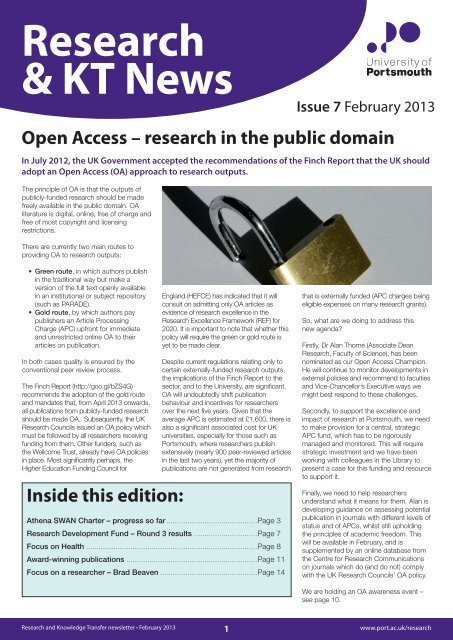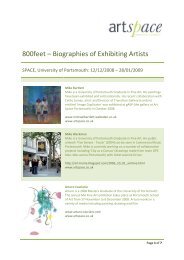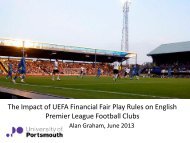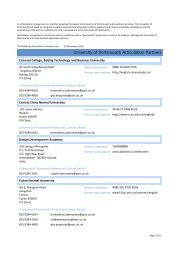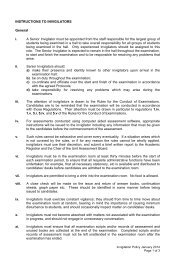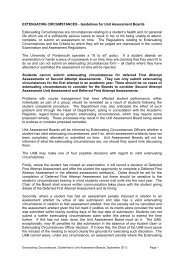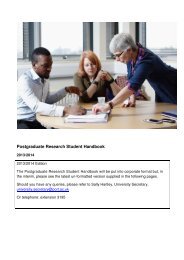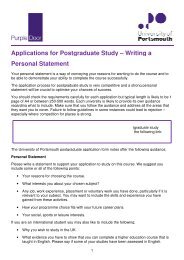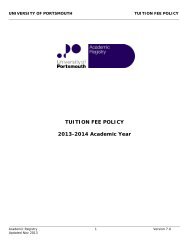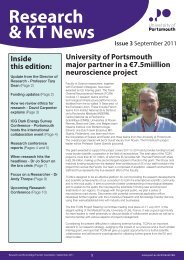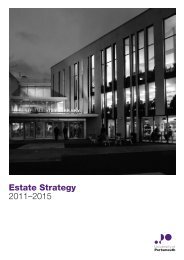RKT News February 2013 - University of Portsmouth
RKT News February 2013 - University of Portsmouth
RKT News February 2013 - University of Portsmouth
You also want an ePaper? Increase the reach of your titles
YUMPU automatically turns print PDFs into web optimized ePapers that Google loves.
Research<br />
& KT <strong>News</strong><br />
Issue 7 <strong>February</strong> <strong>2013</strong><br />
Open Access – research in the public domain<br />
In July 2012, the UK Government accepted the recommendations <strong>of</strong> the Finch Report that the UK should<br />
adopt an Open Access (OA) approach to research outputs.<br />
The principle <strong>of</strong> OA is that the outputs <strong>of</strong><br />
publicly-funded research should be made<br />
freely available in the public domain. OA<br />
literature is digital, online, free <strong>of</strong> charge and<br />
free <strong>of</strong> most copyright and licensing<br />
restrictions.<br />
There are currently two main routes to<br />
providing OA to research outputs:<br />
• Green route, in which authors publish<br />
in the traditional way but make a<br />
version <strong>of</strong> the full text openly available<br />
in an institutional or subject repository<br />
(such as PARADE).<br />
• Gold route, by which authors pay<br />
publishers an Article Processing<br />
Charge (APC) upfront for immediate<br />
and unrestricted online OA to their<br />
articles on publication.<br />
In both cases quality is ensured by the<br />
conventional peer review process.<br />
The Finch Report (http://goo.gl/bZS4G)<br />
recommends the adoption <strong>of</strong> the gold route<br />
and mandates that, from April <strong>2013</strong> onwards,<br />
all publications from publicly-funded research<br />
should be made OA. Subsequently, the UK<br />
Research Councils issued an OA policy which<br />
must be followed by all researchers receiving<br />
funding from them. Other funders, such as<br />
the Wellcome Trust, already have OA policies<br />
in place. Most significantly perhaps, the<br />
Higher Education Funding Council for<br />
Inside this edition:<br />
England (HEFCE) has indicated that it will<br />
consult on admitting only OA articles as<br />
evidence <strong>of</strong> research excellence in the<br />
Research Excellence Framework (REF) for<br />
2020. It is important to note that whether this<br />
policy will require the green or gold route is<br />
yet to be made clear.<br />
Despite current regulations relating only to<br />
certain externally-funded research outputs,<br />
the implications <strong>of</strong> the Finch Report to the<br />
sector, and to the <strong>University</strong>, are significant.<br />
OA will undoubtedly shift publication<br />
behaviour and incentives for researchers<br />
over the next five years. Given that the<br />
average APC is estimated at £1,600, there is<br />
also a significant associated cost for UK<br />
universities, especially for those such as<br />
<strong>Portsmouth</strong>, where researchers publish<br />
extensively (nearly 900 peer-reviewed articles<br />
in the last two years), yet the majority <strong>of</strong><br />
publications are not generated from research<br />
Athena SWAN Charter – progress so far............................................Page 3<br />
Research Development Fund – Round 3 results...............................Page 7<br />
Focus on Health..................................................................................Page 8<br />
Award-winning publications...............................................................Page 11<br />
Focus on a researcher – Brad Beaven...............................................Page 14<br />
that is externally funded (APC charges being<br />
eligible expenses on many research grants).<br />
So, what are we doing to address this<br />
new agenda?<br />
Firstly, Dr Alan Thorne (Associate Dean<br />
Research, Faculty <strong>of</strong> Science), has been<br />
nominated as our Open Access Champion.<br />
He will continue to monitor developments in<br />
external policies and recommend to faculties<br />
and Vice-Chancellor’s Executive ways we<br />
might best respond to these challenges.<br />
Secondly, to support the excellence and<br />
impact <strong>of</strong> research at <strong>Portsmouth</strong>, we need<br />
to make provision for a central, strategic<br />
APC fund, which has to be rigorously<br />
managed and monitored. This will require<br />
strategic investment and we have been<br />
working with colleagues in the Library to<br />
present a case for this funding and resource<br />
to support it.<br />
Finally, we need to help researchers<br />
understand what it means for them. Alan is<br />
developing guidance on assessing potential<br />
publication in journals with different levels <strong>of</strong><br />
status and <strong>of</strong> APCs, whilst still upholding<br />
the principles <strong>of</strong> academic freedom. This<br />
will be available in <strong>February</strong>, and is<br />
supplemented by an online database from<br />
the Centre for Research Communications<br />
on journals which do (and do not) comply<br />
with the UK Research Councils’ OA policy.<br />
We are holding an OA awareness event –<br />
see page 10.<br />
Research and Knowledge Transfer newsletter • <strong>February</strong> <strong>2013</strong><br />
1<br />
www.port.ac.uk/research
Update from the Director <strong>of</strong> Research –<br />
Pr<strong>of</strong>essor Taraneh Dean<br />
As I am writing this I have a PhD student who is undertaking her viva and I must admit I feel like an<br />
expectant parent. The external examiner flew in early this morning and as we walked to the Graduate<br />
School, she commented how nice it was to have a <strong>University</strong>-wide graduate school with a dedicated viva<br />
room, and how impressed she was with the whole campus.<br />
Her comments resonated with me, as one <strong>of</strong> the many people<br />
who have said we don’t shout about what we do well. There are<br />
many things we do well in very difficult circumstances. Looking at<br />
the <strong>February</strong> 2012 R&KT <strong>News</strong> I realised we have had a threefold<br />
increase in the income we reported then. This is a remarkable<br />
achievement and, although I am fully aware that this trend cannot<br />
be sustained, it is pleasing to see growth when many are<br />
experiencing a reduction. This increase is a reflection both <strong>of</strong> the<br />
level <strong>of</strong> activity and <strong>of</strong> our internal review processes to ensure<br />
high quality applications. So, my heart-felt thanks go to all those<br />
who have actively pursued external funding opportunities.<br />
So what has been occupying me? The Research Excellence<br />
Framework (REF) is featuring prominently in my day-to-day<br />
activity. By December <strong>2013</strong> we will have submitted our REF<br />
documents and will have to wait a year for the outcome. Will I<br />
have ‘empty nest syndrome’? More likely it will be a posttraumatic<br />
stress syndrome! The one reassuring theme throughout<br />
this period is that my colleagues at other institutions are facing<br />
the same challenges. In my recent REF Update session to staff,<br />
I spoke about how important our preparation for the next REF will<br />
be and that we need to engage with this now.<br />
much <strong>of</strong> this is driven by a real demand for information and how<br />
much <strong>of</strong> it by a moral case for publicly-funded research to be<br />
freely available. It is certainly going to have both financial and<br />
operational implications for us. I would encourage you to come to<br />
the Open Access Awareness session advertised on page 10.<br />
I am very pleased to see we are organising our first Athena SWAN<br />
Conference (page 10) after recently submitting our application for<br />
the Bronze Award. Signing up to the Athena Swan Charter has<br />
been an important step for us. It demonstrates a commitment to<br />
take all necessary actions at <strong>University</strong>, Faculty and Departmental<br />
levels to monitor progress towards an organisational culture<br />
where all can thrive, are equally valued, and experience equality <strong>of</strong><br />
opportunity for career progression.<br />
On a final note, this newsletter is getting longer and, by all<br />
accounts, is well received. The last issue was read around 1,500<br />
times! We are receiving many more contributions, and informal<br />
feedback is very positive. I hope you find this issue informative.<br />
PS. The student passed her viva with minor corrections. 2.5<br />
hours long. Student and Supervisor happy and both doing well!<br />
The front cover article in this issue highlights the ‘Open Access’<br />
publication movement within Higher Education. Time will tell how<br />
For Women in Science<br />
fellowship programme<br />
The <strong>University</strong> is committed to the advancement and<br />
promotion <strong>of</strong> the careers <strong>of</strong> women in science, technology,<br />
engineering and mathematics, as part <strong>of</strong> our membership <strong>of</strong><br />
the Athena SWAN Charter.<br />
To support this commitment, we are encouraging applications for<br />
the <strong>2013</strong> L’Oréal-UNESCO UK & Ireland For Women in Science<br />
fellowships.<br />
L’Oréal UK & Ireland, the UK National Commission for UNESCO<br />
and the Irish National Commission for UNESCO, with the support<br />
<strong>of</strong> the Royal Society, have joined together to provide a dedicated<br />
UK & Ireland For Women In Science Fellowship Programme for<br />
women scientists at postdoctoral level to enable and/or facilitate<br />
promising scientific research in the life or physical sciences.<br />
Four fellowships will be awarded in <strong>2013</strong> to outstanding female<br />
postdoctoral scientists to assist them with their research. The<br />
fellowships, each worth £15,000, are tenable at any UK or Irish<br />
university or research institute to support a 12-month period <strong>of</strong><br />
research.<br />
The fellowship money can be spent in any number <strong>of</strong> innovative<br />
ways to enable women scientists to further their careers and<br />
facilitate world class research - such as buying equipment, paying<br />
for childcare or funding travel costs to an overseas conference.<br />
Applications close on Friday 15 March, with shortlist publication<br />
on 3 June and an award ceremony on 20 June.<br />
Visit www.womeninscience.co.uk to apply.<br />
Research and Knowledge Transfer newsletter • <strong>February</strong> <strong>2013</strong><br />
2<br />
www.port.ac.uk/research
The Athena SWAN Charter<br />
Dr Jan Shute, who has been leading on Athena SWAN for the <strong>University</strong>,<br />
reports on progress so far.<br />
In November 2011, the <strong>University</strong> became a member <strong>of</strong> the Athena<br />
SWAN Charter (http://www.athenaswan.org.uk/) and in November<br />
2012 became a member <strong>of</strong> the Athena SWAN South East Regional<br />
Network, along with 10 other institutions from across the south east.<br />
In joining the Charter, the <strong>University</strong> committed itself to achieving<br />
the aims <strong>of</strong> Athena SWAN, which are the advancement and<br />
promotion <strong>of</strong> the careers <strong>of</strong> women in science, technology,<br />
engineering, mathematics and medicine (STEMM) in higher<br />
education and research, and the achievement <strong>of</strong> a significant<br />
increase in the number <strong>of</strong> women recruited to top posts.<br />
Bronze award application<br />
A self-assessment team was formed <strong>of</strong> staff from across science,<br />
engineering and technology (SET) departments and the Department<br />
<strong>of</strong> Human Resources. The team has met on a monthly basis since<br />
<strong>February</strong> 2012 to facilitate the first important goal - an application<br />
for an Athena SWAN Bronze Award. This award recognises that the<br />
<strong>University</strong> has a solid foundation for eliminating gender bias and<br />
developing an inclusive culture that values all staff. The team<br />
analysed quantitative staff data and qualitative data in terms <strong>of</strong><br />
policies, practices, systems and arrangements already in place that<br />
support an equal gender balance in SET departments. In this way,<br />
the team identified the challenges and opportunities for<br />
improvement and developed an action plan for the next three years.<br />
In November 2012 the <strong>University</strong> submitted its application for the<br />
Bronze Award and the result will be known in March <strong>2013</strong>. The<br />
application and action plan can be found at the Athena SWAN<br />
website at www.port.ac.uk/research/athena.<br />
Information online<br />
The website also covers a wide range <strong>of</strong> topics in the area <strong>of</strong><br />
women in science, technology, engineering and mathematics<br />
(STEM), including links to Government strategy pages, various<br />
committees aimed at advancing the development <strong>of</strong> women in the<br />
areas <strong>of</strong> STEM, recognised societies and blogs and a wide array <strong>of</strong><br />
funding opportunities available to women. Opportunities include<br />
bursaries for final year post-docs, grants for early career<br />
researchers and other financial assistance available to women<br />
The Athena SWAN committee<br />
undertaking research in the area <strong>of</strong> STEM. To help keep the website<br />
vital and up-to-date, please send useful links and notification <strong>of</strong> new<br />
awards and bursaries in your disciplines to rkts@port.ac.uk.<br />
Support for silver awards<br />
The Vice-Chancellor has provided support for Athena SWAN in the<br />
form <strong>of</strong> a 0.6 FTE Athena SWAN coordinator working in the<br />
Department <strong>of</strong> Human Resources. The appointee will help<br />
departments as they prepare for departmental Athena SWAN Silver<br />
Awards. The silver awards are given to departments that have<br />
assessed where the department is in quantitative and qualitative<br />
terms on gender equality, has highlighted particular challenges and<br />
planned activities for the future. The department should<br />
demonstrate that action has been taken in response to previously<br />
identified challenges and the impact <strong>of</strong> the actions implemented. A<br />
<strong>University</strong> silver award is made when the majority <strong>of</strong> the institution’s<br />
STEM departments hold departmental silver awards.<br />
WISE award short-listing<br />
In November 2012, Dr Karen Masters, a Research Fellow in the Institute <strong>of</strong><br />
Cosmology and Gravitation, was short-listed for a WISE (Women Into Science,<br />
Engineering and Construction) Excellence Award. This award recognises<br />
inspiring organisations and individual women demonstrating a high level <strong>of</strong><br />
commitment to their chosen pr<strong>of</strong>ession and to actively promoting science,<br />
engineering and construction to girls and young women. Dr Masters was one<br />
<strong>of</strong> five women to be shortlisted for the WISE Excellence Award for women<br />
working in the early stages <strong>of</strong> their career in STEM subjects. Dr Masters was<br />
shortlisted for her dedication to promoting careers in STEM to young women.<br />
She is an ambassador for stemnet.org.uk, a network promoting STEM<br />
subjects in schools, and regularly makes school visits to talk about astronomy<br />
and science. An active user <strong>of</strong> Twitter, she frequently tweets on the topic <strong>of</strong><br />
women in science and has more than a thousand followers.<br />
Research and Knowledge Transfer newsletter • <strong>February</strong> <strong>2013</strong><br />
3<br />
www.port.ac.uk/research
Graduate School Update<br />
New Graduate School facilities get the<br />
thumbs up<br />
The Graduate School finally moved into its new base at St<br />
Andrew’s Court in September 2012. The move had been long<br />
awaited but universal feedback from research students,<br />
supervisors, Graduate School Development Programme tutors<br />
and external visitors has been that the facilities were worth<br />
waiting for.<br />
Darren Van Laar, the Director <strong>of</strong> the Graduate School said: ‘The<br />
Graduate School team are all delighted with the reaction to the<br />
new facilities, which represent a significant investment by the<br />
<strong>University</strong> to develop and support the research environment<br />
needed to enable research students to flourish and develop<br />
their research and career orientated skills. Students and<br />
supervisors have been taking advantage <strong>of</strong> the state-<strong>of</strong>-the-art<br />
teaching accommodation which is maintained with the unique<br />
needs <strong>of</strong> research degree students and supervisors in mind.<br />
The new viva room is already proving popular for events such<br />
as major review meetings, vivas and other research-related<br />
meetings.’<br />
The new facilities were <strong>of</strong>ficially opened on 23 January by<br />
Pr<strong>of</strong>essor Jim Al-Khalili – theoretical physicist, author and<br />
broadcaster. Pr<strong>of</strong>essor Al-Khalili said: ‘Having a graduate<br />
research culture is vitally important for universities and for<br />
students. It helps universities maintain a strong reputation for<br />
research and teaching, and gaining a PhD degree gives<br />
students a major boost when seeking employment.<br />
Every research student needs skills training and courses and a<br />
Graduate School is well placed to provide this.’<br />
Our first fifteen months<br />
Time flies and it only seems like yesterday that the new<br />
<strong>University</strong>-wide Graduate School Development programme<br />
(GSDP) was launched back in October 2011. Fifteen<br />
months on and 320 research students have attended over<br />
125 GSDP workshop sessions; 200 new research students<br />
have completed the Graduate Schools ‘Getting Started<br />
with your Research’ workshops and our inaugural Research<br />
Students Conference: ‘Research Matters; Impact Matters’,<br />
held at the New Theatre Royal in October 2012 was a great<br />
success.<br />
Valerie Anderson, the GSDP Coordinator paid tribute to all<br />
those colleagues from different departments and subject<br />
groups around the <strong>University</strong> who contributed to the<br />
success <strong>of</strong> the GSDP events: ‘Students consistently tell us<br />
how much they are learning from the insights, expertise and<br />
experience <strong>of</strong> our workshop tutors – they really are<br />
excellent role models for the research and development<br />
culture the <strong>University</strong> seeks to sustain and enhance’.<br />
New Research Degrees Coordinator for the<br />
Faculty <strong>of</strong> Science<br />
Dr Sally Kilburn (right) has<br />
taken over from Pr<strong>of</strong>essor<br />
Darek Gorecki as the<br />
Faculty Research Degrees<br />
Coordinator (FRDC) for the<br />
Faculty <strong>of</strong> Science. Sally is<br />
an experienced PhD<br />
supervisor who has been<br />
a key member <strong>of</strong> the<br />
Pr<strong>of</strong>essional Doctorate<br />
team.<br />
The FRDC ensures the recruitment, admissions,<br />
supervisory and training processes are working smoothly<br />
within the Faculty and contributes to the quality assurance<br />
and enhancement <strong>of</strong> research degrees. Sally said: ‘I am<br />
fortunate to take on the role from Darek, who achieved a<br />
huge amount by setting up processes to support both<br />
research students and staff across the Faculty, and to have<br />
the administrative support <strong>of</strong> Holly Shawyer and Jody Salt.<br />
My background is in microbiology and immunology and my<br />
current research interests are within health services<br />
research and looking at methods <strong>of</strong> diagnosis, systematic<br />
review and food allergy. I am looking forward to working<br />
with the Graduate School and my colleagues across the<br />
Faculty <strong>of</strong> Science to ensure that postgraduate research<br />
students gain the most from their time at the <strong>University</strong>.’<br />
Pr<strong>of</strong>essor Jim Al-Khalili at the opening <strong>of</strong> The Graduate School<br />
Research and Knowledge Transfer newsletter • <strong>February</strong> <strong>2013</strong><br />
4<br />
www.port.ac.uk/research
Funding update<br />
Successful grants awarded between 24 September 2012 and 9 January <strong>2013</strong><br />
Where the income awarded to the <strong>University</strong> is a portion <strong>of</strong> the<br />
main grant, the <strong>University</strong>’s income is indicated in brackets.<br />
Faculty <strong>of</strong> Creative and Cultural Industries<br />
David Brown<br />
Knowledge Transfer Partnership – Datum Electronic Ltd<br />
Technology Strategy Board – £48,000<br />
Edward Smart<br />
Knowledge Transfer Partnership – Prosig Ltd<br />
Technology Strategy Board – £48,000<br />
Faculty <strong>of</strong> Humanities and Social Sciences<br />
Mark Button<br />
True Cost <strong>of</strong> Inside Fraud<br />
CIFAS (The UK’s fraud prevention service) – £19,500<br />
Dan Finn<br />
Innovation and Welfare Reform<br />
Centre for Economic and Social Inclusion – £40,000<br />
<strong>Portsmouth</strong> Business School<br />
Shabbar Jaffry<br />
<strong>Portsmouth</strong> Harbour Branding Study<br />
<strong>Portsmouth</strong> Habour Renaissance Ltd – £5,000<br />
Pierre Failler<br />
Valuation <strong>of</strong> Coral Reef and Associated Ecosystems in<br />
Guadeloupe<br />
Centre National de la Recherche Scientifique – £27,780<br />
Lisa Jack<br />
Development <strong>of</strong> a Cost Benefit Model for EZH Broccoli<br />
Staples/Monsanto via <strong>University</strong> <strong>of</strong> Lincoln – £11,550<br />
Maebh Harding<br />
How do County Courts share the care <strong>of</strong> children between<br />
parents?<br />
Nuffield Foundation – £106,453<br />
Faculty <strong>of</strong> Science<br />
Liz Twigg<br />
Estimating Census Health Geographies: using synthetic<br />
estimation with secondary survey and census data<br />
Economic and Social Research Council (via Southampton) –<br />
£155,000 (£17,063)<br />
John Allen<br />
OSMOSIS: Ocean Surface Mixing, Ocean Sub-mesoscale<br />
Interaction Study<br />
Natural Environmental Research Council in collaboration with<br />
National Oceanography Centre – £62,459<br />
SEATS: Submarine Estimates <strong>of</strong> Arctic Turbulence Spectra<br />
Natural Environmental Research Council in collaboration with<br />
National Oceanography Centre – £13,288<br />
Richard Teeuw<br />
Use <strong>of</strong> satellite remote sensing for detecting, mapping and<br />
monitoring artisan oil refining in the Niger Delta<br />
Intergrix Consultants Ltd – £39,800<br />
Anthony Butcher<br />
Bid for Synchrotron time<br />
European Synchrotron Facility – €80,000<br />
Humphrey Southall<br />
GIS Partnership knowledge exchange with the <strong>University</strong> <strong>of</strong><br />
Pittsburgh<br />
<strong>University</strong> <strong>of</strong> Pittsburgh – £3,125<br />
Alex Ford<br />
Comparing the transcriptomes <strong>of</strong> normal and intersex crustacea<br />
induced by parasitism<br />
Natural Environmental Research Council – £39,327<br />
Mridula Chopra<br />
Biological actions <strong>of</strong> lycopene in relation to tumour inhibition and<br />
bladder health<br />
H J Heinz Ltd – £4,000<br />
Carina Venter<br />
Does following a special diet in infancy for cow’s milk allergy<br />
have a long term effect on diet in later childhood?<br />
Nutricia Ltd – £36,000<br />
Anastasia Callaghan<br />
Investigating Metabolite-RNase Communication<br />
Biotechnology and Biological Services Research Council –<br />
£337,000<br />
Jerome Swinney<br />
Characterisation <strong>of</strong> the anxiogenic and depressive behavioural<br />
pr<strong>of</strong>ile <strong>of</strong> mice exposed to early life stress in response to<br />
clinically used therapeutic agent<br />
Royal Society – £15,000<br />
Darek Gorecki<br />
Peptide Research Network <strong>of</strong> Excellence Claim 1<br />
EC – Interreg – £423,333<br />
Tara Dean<br />
Systematic review <strong>of</strong> the prevalence <strong>of</strong> food allergy in Europe<br />
European Food Safety Authority – £79,439<br />
Research and Knowledge Transfer newsletter • <strong>February</strong> <strong>2013</strong><br />
5<br />
www.port.ac.uk/research
Martin Barwood<br />
Scottish Sea Farms II Immersion Suit and Lifejacket R&D<br />
Scottish Sea Farms Ltd – £5,600<br />
Mike Tipton<br />
The Impact <strong>of</strong> ‘Riding Up’ on Lifejacket Performance<br />
Royal National Lifeboat Institution – £59,890<br />
Aldert Vrij<br />
Comparing Malevolent and Benevolent Creativity and<br />
Innovation: An Experimental Approach<br />
BAE Systems (Operations) Ltd – £18,830<br />
The effective use <strong>of</strong> two interviewers to facilitate cooperation<br />
and detect deceit<br />
<strong>University</strong> <strong>of</strong> Texas at El Paso – £73,528<br />
The effect <strong>of</strong> using interpreters on rapport, eliciting information<br />
and cues to deceit<br />
The High Value Detainee Interrogation Group (FBI) – £147,059<br />
Joerg Zinken<br />
Linguistic Relativity <strong>of</strong> Situated Action<br />
Universitat Konstanz – £56,357<br />
Bridget Waller<br />
Adaptive function <strong>of</strong> facial displays in crested macaques<br />
(Macaca nigra)<br />
The Leakey Foundation – £12,285<br />
Development and evaluation <strong>of</strong> interactive exhibits promoting<br />
comparative psychology in a zoo environment<br />
British Psychological Society – £19,340<br />
Ge<strong>of</strong>f Pilkington<br />
Application <strong>of</strong> a 3D ‘all human’ blood-brain barrier model in<br />
evaluating nanoparticle-facilitated drug delivery system<br />
Dr Hadwen Trust for Humane Research – £151,877<br />
Toronto Medulloblastoma Collaboration<br />
Brain Tumour UK – £12,700<br />
Jan Shute<br />
Reducing inflammation in cystic fibrosis lung disease by<br />
targeting expression <strong>of</strong> the cystic fibrosis transmembrane<br />
conductance regulator in the endothelium with a coppertobramycin<br />
complex<br />
The Dunhill Medical Trust – £74,593<br />
Faculty <strong>of</strong> Technology<br />
Ivan Jordanov<br />
Development <strong>of</strong> adjoint states for geometrical modelling routines<br />
Engineering and Physical Sciences Research Council/<br />
Technology Strategy Board (managed by: The Smith Institute for<br />
Industrial Mathematics & System Engineering) – £11,800<br />
Pr<strong>of</strong>essor and Reader<br />
appointments<br />
Successful PhD and Doctoral students<br />
The following appointments<br />
were made between 15<br />
September 2012 and 14<br />
January <strong>2013</strong>:<br />
Dr Mark Button <strong>of</strong> the<br />
Institute <strong>of</strong> Criminal Justice.<br />
Appointed to the position <strong>of</strong><br />
Pr<strong>of</strong>essor <strong>of</strong> Criminology.<br />
Dr Valerie Anderson <strong>of</strong> the<br />
<strong>University</strong> <strong>of</strong> <strong>Portsmouth</strong><br />
Graduate School. Appointed<br />
to the position <strong>of</strong> Reader in<br />
Human Resources.<br />
Dr Alex Ford <strong>of</strong> the Institute<br />
<strong>of</strong> Marine Sciences. Appointed<br />
to the position <strong>of</strong> Reader in<br />
Biology.<br />
Dr Sue Bruley <strong>of</strong> the School<br />
<strong>of</strong> Social, Historical and<br />
Literary Studies. Appointed to<br />
the position <strong>of</strong> Reader in<br />
Modern History.<br />
Between 2 October 2012 and 9 January<br />
<strong>2013</strong> the following students completed<br />
their research degrees:<br />
Faculty <strong>of</strong> Creative and Cultural<br />
Industries<br />
Marina Hauer - A Game-Based Learning<br />
Approach to Building Conservation<br />
Education in UK Undergraduate Built<br />
Environment Degrees<br />
Faculty <strong>of</strong> Humanities and Social<br />
Sciences<br />
Maren Kleiven - ‘From Mission Idealism<br />
to Operational Realism’: A Study <strong>of</strong> the<br />
Norwegian Contribution to International<br />
Police Reform Missions<br />
Faculty <strong>of</strong> Science<br />
Aderemi Adelugba - The Assessment <strong>of</strong><br />
Reticulocyte and Erythrocyte<br />
Haemoglobin Contents, and their use in<br />
the Evaluation <strong>of</strong> Iron Status in<br />
Hospitalised Patients<br />
Katherine Brown - Utility <strong>of</strong> the<br />
Calliphora vicina (Diptera: Calliphoridae)<br />
Pupal Stage for Providing Temporal<br />
Information for Death Investigations<br />
Penelope Delf - A Research Project to<br />
Design, Implement and Assess the<br />
Effectiveness <strong>of</strong> a Sole eLearning module<br />
to Prepare Non-medical Healthcare<br />
Practitioners to Report Nuclear Medicine<br />
Bone Scans<br />
Sharon Glaysher - Molecular Basis for<br />
Sequential Chemotherapy: the Effect <strong>of</strong><br />
Chemotheraphy on Survival Pathways<br />
Clare-Louise Sandell - A Study <strong>of</strong><br />
Self-reported Surgical Site Infection Post<br />
Total Hip or Total Knee Replacement<br />
Faculty <strong>of</strong> Technology<br />
Colm Mulhern - Collective Induced<br />
Phenomena in Systems <strong>of</strong> Coupled<br />
Oscillators<br />
Research and Knowledge Transfer newsletter • <strong>February</strong> <strong>2013</strong><br />
6<br />
www.port.ac.uk/research
RDF Round 3: Successful projects<br />
On 8 November 2012, the Research Development Fund (RDF) panel met to consider the<br />
applications that were submitted in round three <strong>of</strong> the RDF competition. As a result, RDF awards<br />
have been made to support the following projects:<br />
1. Assessing human<br />
exposure to carcinogenic<br />
fibrous zeolites in the<br />
environment<br />
Principal Investigator<br />
- Derek Rust<br />
(Faculty <strong>of</strong> Science)<br />
Co-Investigators - Dean<br />
Bullen, Andy Gibson,<br />
Mike Fowler (Faculty <strong>of</strong><br />
Science)<br />
Collaborators -<br />
Department <strong>of</strong> Geological<br />
Engineering, <strong>University</strong> <strong>of</strong><br />
Ankara, Turkey, Department<br />
<strong>of</strong> Geological Engineering,<br />
Hacettepe <strong>University</strong>, Turkey,<br />
Department <strong>of</strong> Environment<br />
and Geological Sciences,<br />
<strong>University</strong> <strong>of</strong> Milan-Bicocca<br />
Derek Rust<br />
2. Establishing an<br />
expression system for<br />
serum amyloid P<br />
component in a human<br />
cell line<br />
Principal Investigator<br />
- Simon Kolstoe (Faculty <strong>of</strong><br />
Science)<br />
Co-Investigators - Sassan<br />
Hafizi (Faculty <strong>of</strong> Science)<br />
Collaborators - <strong>University</strong><br />
College London, <strong>University</strong><br />
<strong>of</strong> Oxford<br />
Simon Kolstoe<br />
Jana Ries<br />
3. ORIBUS – a research<br />
network to develop and<br />
apply the science and<br />
technology <strong>of</strong><br />
operational research to<br />
build advanced and<br />
innovative business<br />
processes<br />
Principal Investigator -<br />
Jana Ries (<strong>Portsmouth</strong><br />
Business School)<br />
Co-Investigatorss<br />
- Ashraf Labib (<strong>Portsmouth</strong><br />
Business School), David<br />
Brown and Edward Smart<br />
(Faculty <strong>of</strong> Creative and<br />
Cultural Industries), Xiang<br />
Song and Dylan Jones<br />
(Faculty <strong>of</strong> Technology)<br />
Karen Thorpe<br />
4. Preliminary study on the<br />
biological impact <strong>of</strong><br />
conventional and<br />
degradable plastics in<br />
the marine environment<br />
Principal Investigator<br />
- Karen Thorpe (Faculty <strong>of</strong><br />
Science)<br />
Co-Investigators -<br />
Zhongyi Zhang (Faculty <strong>of</strong><br />
Technology), Graham Mills<br />
(Faculty <strong>of</strong> Science),<br />
Collaborators - <strong>University</strong><br />
<strong>of</strong> Exeter<br />
These projects represent exciting new research avenues and collaborations, both within and outside the <strong>University</strong>. Many<br />
congratulations to the successful applicants. For more information about the successful projects please see:<br />
http://www.port.ac.uk/intranet/rkts/researchsupport/rdf/.<br />
Corrections<br />
In the last edition <strong>of</strong> R&KT <strong>News</strong> we incorrectly stated that Mark Field and Chris Huggins were the organisers <strong>of</strong> the Centre for<br />
European and International Studies Research conference. The correct organisers <strong>of</strong> the conference were Karen Heard-Laureote and<br />
Wolfram Kaiser. We apologise for this error.<br />
Research and Knowledge Transfer newsletter • <strong>February</strong> <strong>2013</strong><br />
7<br />
www.port.ac.uk/research
On Wednesday 28 November 2012, academics, healthcare practitioners, support organisations,<br />
schools and interested members <strong>of</strong> the public took part in the <strong>University</strong>’s first collaborative public<br />
outreach lecture. The lecture, entitled ‘Focus on health – Asthma and allergy in your family’,<br />
delivered a progressive series <strong>of</strong> talks aimed at engaging the audience with the <strong>University</strong>’s<br />
research on both a personal and practical level.<br />
Chairing the event, Pr<strong>of</strong>essor Taraneh Dean said: ‘We aimed to<br />
reach out to local families who suffer with asthma and allergies<br />
and help them realise they can have more control over their<br />
condition and their treatment plan and that their voice can be<br />
heard.’<br />
Speakers at the event included Dr Carina Venter, senior<br />
research fellow at the <strong>University</strong> <strong>of</strong> <strong>Portsmouth</strong> and registered<br />
dietician who specialises in food hypersensitivity in children; Dr<br />
Tom Brown, who works in the Asthma Research Team at Queen<br />
Alexandra Hospital in <strong>Portsmouth</strong> and is currently researching<br />
ways to better predict asthma attacks; Dr Charlotte Wade, a GP<br />
in Somers Town Health Centre; and Hazel Gowland, who has a<br />
severe nut allergy and works for Allergy Action.<br />
After the speakers had presented, the audience were given an<br />
opportunity to ask questions <strong>of</strong> the experts. This led to an active<br />
debate that looked at future treatments, dispelled myths about<br />
individual conditions and gave a practical view <strong>of</strong> how medical<br />
science was progressing in the lab, in hospitals and with<br />
patients.<br />
Three children from local schools received prizes at the event for<br />
winning an art competition to design a poster showing what it<br />
looks or feels like to live with asthma and allergies. As part <strong>of</strong> the<br />
event’s schools element, Dr Heather MacKenzie, a researcher<br />
specialising in food allergies, had visited the schools involved and<br />
talked to pupils about living with asthma and allergies.<br />
The event finished with a networking session at which academic<br />
posters and artwork from the schools and charities were<br />
presented.<br />
Pr<strong>of</strong>essor John Craven presents a prize to Charlotte Larder for her poster design.<br />
Attendees ask questions <strong>of</strong> the experts.<br />
Dr Heather MacKenzie discusses her research with an attendee.<br />
Research and Knowledge Transfer newsletter • <strong>February</strong> <strong>2013</strong><br />
8<br />
www.port.ac.uk/research
Our researchers<br />
organise international<br />
conferences<br />
LARC Neuroscience Network<br />
On Friday 9 November 2012 the <strong>University</strong><br />
hosted the 16th Annual Meeting <strong>of</strong> the<br />
LARC‐Neuroscience Network.<br />
The network was originally created by neuroscientists working in<br />
the universities <strong>of</strong> Lille, Amiens, Rouen and Caen (LARC). Over<br />
the years the network extended to Brest and Rotterdam and<br />
currently involves over 40 research teams from universities and<br />
institutes located in northern France, Belgium and Holland.<br />
<strong>Portsmouth</strong> was the first UK institution to join LARC in 2008.<br />
The network promotes collaboration between member<br />
laboratories, the training <strong>of</strong> young neuroscientists and the<br />
exchange <strong>of</strong> staff and knowledge, resulting in numerous<br />
successful joint projects. Recent successes include three large<br />
Interreg EU grants - the Advanced Microscopy Network, the<br />
Trans Channel Neuorscience Network and the Peptide<br />
Research Network - involving dozens <strong>of</strong> institutions with a<br />
combined budget <strong>of</strong> over €13 million. These ongoing projects<br />
have already produced several important findings and<br />
publications.<br />
The LARC network (http://larc-neurosciences.org) organises<br />
various scientific meetings as well as events to promote<br />
neuroscience research amongst the public, the most important<br />
being the annual LARC Neuroscience Network meeting. These<br />
meetings are open to all, thus showcasing LARC’s achievements<br />
and creating opportunities for new collaborations. The meetings<br />
promote networking at all levels and allow young researchers<br />
(PhD students and post-docs) to present their results alongside<br />
distinguished keynote speakers.<br />
This year’s meeting in <strong>Portsmouth</strong> was the first to be held outside<br />
France. The local organising committee included Pr<strong>of</strong>essor Darek<br />
Gorecki, School <strong>of</strong> Pharmacy and Biomedical Sciences, Dr Frank<br />
Schubert, School <strong>of</strong> Biological Sciences and Mr Andy Mew,<br />
Research and Knowledge Transfer Services, all supported by Dr<br />
David Vaudry and Mr Alexis Lebon (Rouen, France). The meeting<br />
was held in Action Stations at the Historic Dockyard and thanks<br />
to the support from the Trans Channel Neuroscience Network<br />
grant (EU, Interreg) it was free to all participants.<br />
The meeting was attended by 120 participants, with 78<br />
researchers from France, 37 from Britain, two from Poland, two<br />
from the Netherlands and one from Spain.<br />
Pr<strong>of</strong>essor John Craven welcomed the participants and the<br />
programme included keynote speakers Pr<strong>of</strong>essor Graham<br />
Collingridge FRS, Director <strong>of</strong> the MRC Centre for Synaptic<br />
Plasticity, Bristol <strong>University</strong> and a former president <strong>of</strong> the British<br />
Neuroscience Association, and Pr<strong>of</strong>essor Peter Somogyi FRS,<br />
Director, MRC Anatomical Neuropharmacology Unit, Oxford<br />
<strong>University</strong>.<br />
The award for the best oral presentation was sponsored by<br />
Scientifica and the best poster and the runner-up poster awards<br />
were sponsored by Tripple Red and Roche respectively. The<br />
winner <strong>of</strong> the best oral presentation was Ms Madga Hamza,<br />
INSERM Unit 982, Mont-Saint-Aignan, France. The poster<br />
prizes went to Nicole Bellefontaine, INSERM Unit 837, Lille,<br />
France and Alexandra Spittle, Bristol <strong>University</strong>.<br />
The 16th Annual Meeting was received with great enthusiasm by<br />
all participants. The strong presence <strong>of</strong> scientists from <strong>Portsmouth</strong><br />
demonstrated the vibrant research culture <strong>of</strong> our <strong>University</strong>.<br />
Attendees at the 16th Annual Meeting at Action Stations, <strong>Portsmouth</strong>.<br />
Channel 4 30th Birthday Conference<br />
Researchers based in the <strong>University</strong>’s Centre for Cultural and<br />
Creative Research celebrated Channel 4’s 30th birthday on 2<br />
November 2012 with a two-day conference at BFI Southbank<br />
in London.<br />
The event brought together media historians and key personnel<br />
from the film and television industries to review Channel 4’s<br />
contribution to British film culture over three decades, and to<br />
debate the future <strong>of</strong> public service broadcasters’ support for the<br />
UK film industry in the light <strong>of</strong> the Government’s Film Policy<br />
Review, published in January 2012.<br />
The conference marked the highpoint <strong>of</strong> a four-year study funded<br />
by the Arts and Humanities Research Council (AHRC) entitled<br />
‘Channel 4 and British Film Culture’ (2010-2014), led by Dr Justin<br />
Smith, Reader in British Film Culture (www.c4film.co.uk).<br />
A conference report by Dr Leuan Franklin, Research Assistant on the<br />
project, is published in Viewfinder, the magazine <strong>of</strong> project partners<br />
<strong>of</strong> the British Universities Film and Video Council, and can be<br />
accessed at: http://bufvc.ac.uk/articles/channel-4-thirty-years-later.<br />
Research and Knowledge Transfer newsletter • <strong>February</strong> <strong>2013</strong><br />
9<br />
www.port.ac.uk/research
Upcoming events<br />
Athena SWAN Conference<br />
Wednesday 6 March 2.00pm – 5.00pm<br />
Portland Building<br />
The first <strong>University</strong> Athena SWAN conference will<br />
look at past, present and future progress regarding<br />
the Athena SWAN objectives, which are to promote<br />
the advancement <strong>of</strong> women in science, technology,<br />
engineering and maths (STEM). The conference will<br />
put them into context for the <strong>University</strong> and provide<br />
an opportunity for female academics in STEM<br />
departments to share their career successes in<br />
poster form.<br />
The Chancellor, Sandi Toksvig, will open the<br />
conference followed by a keynote speech from Dame<br />
Jocelyn Bell Burnell DBE, FRS, FRAS, a British<br />
astrophysicist, who as a postgraduate student<br />
discovered the first radio pulsars with her thesis<br />
supervisor Antony Hewish. Other speakers include Dr<br />
Esther Sonnet, Head <strong>of</strong> School <strong>of</strong> Creative Arts, Film<br />
and Media, who will be talking on the brains behind<br />
the beauty <strong>of</strong> Hedy Lamarr, Pr<strong>of</strong>essor Taraneh Dean<br />
who will talk about the challenges she faced on her<br />
road to a successful research career and Pr<strong>of</strong>essor<br />
Paul Hayes who will talk about how departments can<br />
aspire to achieve the Athena SWAN Silver Award.<br />
To book a place, visit<br />
http://athenaswanconference.eventbrite.co.uk/.<br />
Open Access<br />
Thursday 7 March<br />
On 7 March <strong>2013</strong> at 2.30pm, all academic staff are<br />
invited to an Open Access awareness raising event.<br />
This event will outline the Open Access agenda in<br />
the UK, explain what this means for all researchers<br />
and update you on the plan for addressing Open<br />
Access at the <strong>University</strong>.<br />
To register, please visit<br />
http://openaccess.eventbrite.co.uk/.<br />
Research Excellence Framework<br />
(REF) update<br />
July <strong>2013</strong><br />
Where are we with the REF? How will it affect<br />
funding for my research now and in the future? The<br />
event aims to provide vital information and an<br />
opportunity to ask questions regarding REF. It will<br />
address what the REF means for you and what you<br />
can do to prepare for the next REF. To book a place,<br />
visit http://refupdate.eventbrite.co.uk/.<br />
For further information or enquiries about<br />
any <strong>of</strong> these events, please contact<br />
Research and Knowledge Transfer Services<br />
on ext 6191 or email rkts@port.ac.uk.<br />
New Grants Officer<br />
The <strong>University</strong> has appointed a new Grants Officer, Colin Waring, who will<br />
support researchers in applying for research funding from an increasing range<br />
<strong>of</strong> sources. Colin joined Research and Knowledge Transfer Services in<br />
November 2012 and will work with individuals and research groups in all<br />
faculties, and with our <strong>University</strong> Network facilitators Amy Drahota (UPAN), and<br />
David Hutchinson (UPEN) (see page 13), to provide relevant and value-added<br />
information on research funding opportunities and to support the submission<br />
<strong>of</strong> timely and high-quality bids.<br />
Colin initially graduated in zoology from the<br />
<strong>University</strong> <strong>of</strong> Aberdeen, and then studied<br />
for a PhD at Heriot-Watt <strong>University</strong>. He<br />
previously worked as a Principal Lecturer in<br />
the School <strong>of</strong> Biological Sciences here at<br />
the <strong>University</strong> <strong>of</strong> <strong>Portsmouth</strong>. He wrote and<br />
reviewed grant proposals, publications and<br />
supervised 12 PhD and MPhil students,<br />
and brings this breadth <strong>of</strong> experience to a<br />
vital research support role at the <strong>University</strong>.<br />
If you have some research ideas and want<br />
help identifying potential funders then<br />
please feel free to email colin.waring@port.ac.uk or call on ext 6195.<br />
Pr<strong>of</strong>essor Jim Smith’s inaugural<br />
lecture a great success<br />
Wednesday 6 <strong>February</strong> saw the inaugural lecture <strong>of</strong> Pr<strong>of</strong>essor Jim Smith<br />
from the School <strong>of</strong> Earth and Environmental Sciences. In front <strong>of</strong> a packed<br />
audience, Jim took the crowd on a guided tour <strong>of</strong> his life’s work.<br />
Jim started life as an astrophysicist, but<br />
his search for a PhD coincided with the<br />
worse radioactive disaster in history -<br />
Chernobyl. He explained how difficult it<br />
was to use mathematics to understand<br />
and predict change in the natural<br />
environment. He used examples from his<br />
own work modelling the movement <strong>of</strong><br />
radioactivity through lakes and their<br />
associated ecosystems to expertly make<br />
his point. Jim clearly demonstrated the<br />
importance <strong>of</strong> scientific rigour, which in<br />
turn ensures a sound evidence-base that<br />
enables you to make predictions for policy<br />
makers and practitioners.<br />
Jim explained that very <strong>of</strong>ten scientists have their ‘arch-enemies’, with<br />
arguments fought out through peer reviewed journals. In Jim’s case, his<br />
arch-enemies were two scientists from France and USA. Jim explained<br />
why he did not agree with their research findings and took us through the<br />
evidence to solidify his argument. All this was taken in the light-hearted<br />
way it was meant, and the assembled crowd clearly enjoyed his lecture.<br />
Pr<strong>of</strong>essor Paul Hayes, Dean <strong>of</strong> the Faculty <strong>of</strong> Science summed the<br />
evening up, saying: ‘I am both pleased and proud to have Jim as a<br />
member <strong>of</strong> our Faculty.’<br />
The next inaugural lecture ‘Mapping the Universe’ will be delivered by Will<br />
Percival, Pr<strong>of</strong>essor <strong>of</strong> Cosmology at the Institute <strong>of</strong> Cosmology and<br />
Gravitation on Thursday 21 March <strong>2013</strong>.<br />
Research and Knowledge Transfer newsletter • <strong>February</strong> <strong>2013</strong><br />
10<br />
www.port.ac.uk/research
Award-winning publications<br />
Two <strong>of</strong> our researchers have won awards for their recent publications:<br />
Pr<strong>of</strong>essor Lisa Jack - British Accounting and Finance Association prize for most outstanding article<br />
What was the award?<br />
With co-author Omiros Georgiou, now at the London School <strong>of</strong> Economics, the paper, ‘In pursuit <strong>of</strong> Legitimacy: A history behind fair<br />
value accounting’, was awarded this prize at the annual conference in April 2012. The same paper also won the Neil Rackham Prize<br />
for best paper published in 2011-12, awarded at the <strong>Portsmouth</strong> Business School’s Annual Research and Knowledge Exchange<br />
conference in June 2012.<br />
Why did you win this award?<br />
The prize is awarded to the authors <strong>of</strong> the article that is assessed by members <strong>of</strong> the Editorial<br />
Board and the Board <strong>of</strong> Associate Editors as being the most outstanding <strong>of</strong> the articles published<br />
in The British Accounting Review during 2011.<br />
How does this award benefit your career?<br />
Both awards bring us greater recognition in our discipline, creating opportunities for further<br />
research projects.<br />
Is there anything you’d like to add which may be <strong>of</strong> interest?<br />
The paper evolved from a Master’s dissertation and was originally sparked by a discussion in class.<br />
It’s a great example <strong>of</strong> how research informed teaching can lead to successful research projects.<br />
Pr<strong>of</strong>essor Mike Tipton - best paper award from the<br />
International Journal <strong>of</strong> Health Promotion and Education<br />
What was the award?<br />
It was the paper on the work <strong>of</strong> the International Task Force on<br />
Drowning. I was the UK member. We came up with two groups <strong>of</strong><br />
eight messages for the prevention <strong>of</strong> drowning. The World Health<br />
Organisation estimates that 1.2 million people drown each year - it<br />
is the first or second most common cause <strong>of</strong> accidental death in<br />
many countries. More children drown than die from either malaria,<br />
TB, HIV or polio.<br />
Why did you win this award?<br />
The panel thought the paper would make a significant contribution<br />
to reducing the number <strong>of</strong> people who drown across the world. It<br />
was good to see drowning recognised for the problem it is amongst<br />
all <strong>of</strong> the other topics that could potentially have won the award.<br />
For more information, visit<br />
http://www.worldconferenceondrowningprevention2011.org/.<br />
Globally, many organisations have attempted to address the risk <strong>of</strong><br />
drowning associated with aquatic recreation by promoting a diverse<br />
plethora <strong>of</strong> drowning prevention messages. The goal <strong>of</strong> this work<br />
was to establish, through international consensus, a minimum<br />
number <strong>of</strong> simple drowning prevention guidelines targeted at<br />
parents, other care-givers and individuals for non boating-related<br />
recreation around open water. The guidelines were developed to be<br />
useful in open water settings around the world.<br />
How does this award benefit your career?<br />
Such awards reaffirm that what you are working on is important and<br />
that you are doing it well. They are a form <strong>of</strong> peer review. They also<br />
help reaffirm the reputation <strong>of</strong> the group, the Department <strong>of</strong> Sport<br />
and Exercise Science, and the <strong>University</strong> as a centre <strong>of</strong> excellence,<br />
and support things like impact cases for the Research Excellence<br />
Framework.<br />
2012 was a good year for awards. With Hitoshi Wakabayashi,<br />
Martin Barwood and Clare Eglin, I also won the best paper award at<br />
the meeting <strong>of</strong> the Japanese Society <strong>of</strong> Human-Environment<br />
System for a paper on human acclimation to cold. With Flora Bird,<br />
Jim House and Heather Lunt I won the Cameron Award for best<br />
presentation at the Fédération Internationale de Natation (FINA)<br />
sports medicine conference in Istanbul for a paper on<br />
acclimatisation in cross channel swimming children.<br />
Is there anything you’d like to add which may be <strong>of</strong> interest?<br />
If anyone would like to find out more about the research we do in<br />
the Department <strong>of</strong> Sport and Exercise Science or have a look<br />
around our facilities, please get in touch or visit our website<br />
www.port.ac.uk/departments/academic/sportscience/research/.<br />
Research and Knowledge Transfer newsletter • <strong>February</strong> <strong>2013</strong><br />
11<br />
www.port.ac.uk/research
An update from<br />
Knowledge Services<br />
New Director <strong>of</strong> Knowledge<br />
Services<br />
In October 2012 Dr Alistair<br />
McDermott took up the position <strong>of</strong><br />
Director <strong>of</strong> Knowledge Services.<br />
Over the last few months Alistair has<br />
been working with Vice-Chancellor’s<br />
Executive and Deans to look at the<br />
<strong>University</strong>’s knowledge services<br />
strategy in tandem with faculty<br />
strategies to determine the areas <strong>of</strong><br />
strength and commonality that will<br />
allow us as an institution to focus our resources.<br />
Knowledge Transfer Partnerships secured by<br />
<strong>University</strong> Academics<br />
In recent months the <strong>University</strong> has seen an increase in<br />
opportunities to apply its knowledge base to Knowledge Transfer<br />
Partnerships (KTP). The following awards were made in the latter<br />
half <strong>of</strong> 2012:<br />
Ivan Jordanov – Industrial Mathematics Shorter Knowledge<br />
Transfer Partnership with Airbus Operations Ltd<br />
Sarinova Simandjuntak – Shorter Knowledge Transfer Partnership<br />
with Magma Global Ltd<br />
Edward Smart – Shorter Knowledge Transfer Partnership with<br />
Prosig Ltd<br />
David Brown – Shorter Knowledge Transfer Partnership with<br />
Datum Electronic Ltd<br />
David Brown – Knowledge Transfer Partnership with Printed Motor<br />
Works Ltd<br />
Jim Briggs – Knowledge Transfer Partnership with Lane<br />
Telecommunications<br />
Djamel Azzi – Knowledge Transfer Partnership with Smart-e Ltd<br />
If you would like to know more about KTP funding, contact<br />
Research and Knowledge Transfer Services on ext 6191, email<br />
rkts@port.ac.uk or visit: http://www.port.ac.uk/intranet/rkts/<br />
knowledgetransfer/ktp/.<br />
Innovation Space<br />
In November 2012 the <strong>University</strong> took the decision to develop<br />
Halpern House into a centre for business innovation. This innovation<br />
space will house companies in a dynamic and vibrant community<br />
that delivers a culture <strong>of</strong> support and growth. The <strong>University</strong> is<br />
partnering with the hugely successful Innovation Warehouse project<br />
in London to deliver three themes for the space:<br />
• A dynamic incubation environment for companies looking<br />
at digital media business.<br />
• A collaborative working environment for academic staff<br />
and research students to work alongside external<br />
companies to explore new research possibilities together.<br />
• Facilities to host networking and support events that add<br />
to the vibrancy <strong>of</strong> the space.<br />
The project is key to<br />
supporting our strategic<br />
aims within the <strong>University</strong><br />
and will provide<br />
opportunities and support<br />
for student entrepreneurs,<br />
linking companies and<br />
academics together.<br />
Lorraine Farrelly, from the<br />
Architecture Projects<br />
An artist’s impression <strong>of</strong> Innovation Space<br />
Office at the <strong>University</strong>, has<br />
been instrumental in developing a vision for the space that will<br />
deliver and support the project’s goals. Scheduled to open<br />
in April <strong>2013</strong>, this project is an exciting development in the<br />
<strong>University</strong>’s continued commitment to valuable partnerships<br />
and the growth <strong>of</strong> our role in delivering economic prosperity for<br />
the region.<br />
Featured website<br />
The <strong>University</strong> recently began subscribing to InCites. InCites is a<br />
new research analytics tool produced by Thomson Reuters which<br />
enables citation based evaluations in relevant subject areas –<br />
mainly Health and Sciences.<br />
Incites gives you the ability to compare research performance<br />
against other institutions; pinpoint influential and emerging<br />
researchers <strong>of</strong> research trends; showcase strengths and identify<br />
areas for growth; support accreditation activity; and plan a<br />
research strategy with metrics that can be tracked over time.<br />
counts exclusively from the Web <strong>of</strong> Science database, as well as<br />
rank the value <strong>of</strong> publishing journals.<br />
If you are interested in further information and useful<br />
documentation on the use <strong>of</strong> InCites please email ref@port.ac.uk<br />
or visit http://goo.gl/7tWpa.<br />
Subscription to the s<strong>of</strong>tware has been provided to key<br />
stakeholders across the institution (a list is available here:<br />
http://goo.gl/7tWpa). InCites will support stakeholders by<br />
adding to the tools available to measure the strength <strong>of</strong> relevant<br />
academic publications for the Research Excellence Framework<br />
(REF) 2014 submission, and support other activity outside <strong>of</strong> the<br />
REF, such as peer review and external assessment exercises now<br />
and in the future.<br />
InCites users at the institution will benefit from the ability to<br />
assess academic publications against comprehensive citation<br />
Research and Knowledge Transfer newsletter • <strong>February</strong> <strong>2013</strong><br />
12<br />
www.port.ac.uk/research
<strong>University</strong> <strong>of</strong> <strong>Portsmouth</strong> Environment<br />
Network (UPEN)<br />
The <strong>University</strong> <strong>of</strong> <strong>Portsmouth</strong> Environment<br />
Network is looking to the future. The<br />
suggestion is to continue the journey<br />
through themes:<br />
The networks mirror the priorities <strong>of</strong> the<br />
<strong>University</strong>, so it is the intention that the<br />
themes will engage education, research<br />
and knowledge services.<br />
• ecosystem complexity and<br />
environmental change<br />
• environmental hazards and<br />
engineering<br />
• sustainable society<br />
Cross-thematic interest groups are also<br />
suggested for those whose work may<br />
support the development <strong>of</strong> the themes.<br />
These interest groups could include<br />
‘Measuring, monitoring and modelling’,<br />
‘risk and decisions’ or ‘communication<br />
and engagement’.<br />
To take these ideas further, three half-day<br />
events will be held before Easter to finalise<br />
how we, as a network, take this forward.<br />
To read more about the themes and to sign<br />
up, visit www.port.ac.uk/upenthemes.<br />
To find out more about our recent activities<br />
please have a look at our latest newsletter<br />
at www.port.ac.uk/upennews.<br />
David Hutchinson, UPEN Facilitator<br />
<strong>University</strong> <strong>of</strong> <strong>Portsmouth</strong> Ageing Network<br />
(UPAN)<br />
New year, new website! Keep your eyes peeled for the<br />
Ageing Network’s new website at www.port.ac.uk/ageing,<br />
bringing you the latest news, opportunities and activities from<br />
across the Ageing Network. Some highlights from UPAN’s recent<br />
activities include:<br />
Research: Jerome Swinny<br />
from the School <strong>of</strong><br />
Pharmacy and Biomedical<br />
Sciences has been<br />
awarded £80,000 from the<br />
Alzheimer’s Society. This<br />
PhD studentship will be<br />
exploring an important<br />
region <strong>of</strong> the brain which,<br />
as well as helping to<br />
develop strategies to cope<br />
with stressful life events,<br />
also produces a chemical<br />
called noradrenaline,<br />
which is important for<br />
cognition and emotion.<br />
The studentship will<br />
explore the mechanisms<br />
behind emotional<br />
disturbances in<br />
Alzheimer’s disease, such<br />
Amy Drahota, UPAN Facilitator<br />
as depression, anxiety,<br />
and aggression, which are thought to be different to those found<br />
in people without Alzheimer’s disease. It is hoped that by<br />
studying these mechanisms, we may uncover potential points for<br />
improved therapeutic intervention in the future.<br />
community groups and residents, members <strong>of</strong> <strong>Portsmouth</strong> City<br />
Council and researchers from across the <strong>University</strong>. A series <strong>of</strong><br />
PhD posters on ageing-related topics were also presented on the<br />
day, which helped raise the pr<strong>of</strong>ile <strong>of</strong> the ageing research we are<br />
doing with our local community. The day included a participatory<br />
tai chi demonstration over the lunch break and a sing-a-long live<br />
band to wrap things up.<br />
Community outreach: We’re working with the Students’ Union<br />
and Age UK <strong>Portsmouth</strong> on a creativity project to inject some<br />
colour into the decor <strong>of</strong> Age UK’s Bradbury Centre in Fratton.<br />
This is an intergenerational project with funding awarded from<br />
Dulux’s ‘Let’s Colour’ funding stream, involving the older people<br />
who use the centre and student volunteers. The project is running<br />
from January to March. Student social workers will also be<br />
getting in on the action and will be working creatively with the<br />
older people at the centre, to generate artefacts, as they work<br />
towards demonstrating their fitness for practice.<br />
Sign up at http://paintingageuk.eventbrite.co.uk/.<br />
Education: As part <strong>of</strong> the Ageing Network, we’re compiling a<br />
running list <strong>of</strong> student projects, for undergraduate and postgraduate<br />
levels, to include questions in need <strong>of</strong> answers, projects<br />
in progress and completed projects. We are working with the<br />
Joint Strategic Needs Assessment group at <strong>Portsmouth</strong> City<br />
Council to generate and distribute new project ideas across many<br />
disciplines. Keep an eye on the website for updates, and please<br />
get in touch if you have projects <strong>of</strong> your own you’d like to<br />
advertise.<br />
Contact: amy.drahota@port.ac.uk.<br />
Knowledge exchange: The PEOPPLE Project (Putting Evidence<br />
for Older People into Practice in Living Environments) hosted a<br />
celebratory end-<strong>of</strong>-project conference, bringing together local<br />
Research and Knowledge Transfer newsletter • <strong>February</strong> <strong>2013</strong><br />
13<br />
www.port.ac.uk/research
Focus on a researcher<br />
Brad Beaven<br />
Principal Lecturer in the School <strong>of</strong> Social,<br />
Historical and Literary Studies (SSHLS)<br />
Current project titles:<br />
I am a social and cultural historian who focuses on British<br />
society in the nineteenth and the early twentieth centuries. I lead<br />
one <strong>of</strong> the Faculty’s strategic research projects; ‘Port Towns and<br />
Urban Cultures’ exploring the social and cultural impact <strong>of</strong> ports<br />
on the urban hinterland from the eighteenth century to the<br />
modern period. We have developed this project in collaboration<br />
with the National Museum <strong>of</strong> the Royal Navy (NMRN). My own<br />
research focuses on the social and cultural context to<br />
‘sailortowns’ between 1800 to 1939 and I have begun<br />
examining over 200 sailor diaries <strong>of</strong> all ranks.<br />
Why did you become a researcher?<br />
History is not a static subject but one that is constantly reinterpreting<br />
and challenging orthodox viewpoints. You can go<br />
for days without finding relevant material and then stumble upon<br />
a fantastic set <strong>of</strong> archives that alters your whole perception <strong>of</strong><br />
an event. It is that piecing together <strong>of</strong> fragments from the past<br />
and shedding new light on a long-standing historical<br />
controversy that makes research an enjoyable experience.<br />
Describe a typical day at work:<br />
I am currently organising an international conference titled ‘Port<br />
Towns and Urban Cultures’ with our partners at the NMRN for<br />
July <strong>2013</strong>. I am also writing a paper for a social and cultural<br />
workshop on maritime history in Aland Islands, Finland. The<br />
diaries that I have been researching will hopefully provide a nice<br />
contrast as they reveal the sailor’s actual experience <strong>of</strong> sailor<br />
town life. With this project, the advantage is that there are a<br />
huge number <strong>of</strong> sailor diaries on my doorstep.<br />
Who has influenced you most in life and why?<br />
My parents brought me and my brother up in a very happy<br />
household in Coventry between the late 1960s and 1980s, a<br />
period which saw great changes in the city’s industrial<br />
landscape. My whole family – grandparents, Dad and brother<br />
worked in the declining car industry. My grandfather used to<br />
take me to play snooker at some <strong>of</strong> the large, elaborate social<br />
clubs complete with ball rooms, bars and snooker tables. These<br />
have long since been demolished but I think it inspired me to try<br />
to capture ‘club life’ in my research on working-class leisure.<br />
More recently it has been my wife Becky, and our sons George<br />
(eight) and Sam (two) who can always be relied upon to help me<br />
keep work in perspective.<br />
What are your interests outside <strong>of</strong> work?<br />
At every opportunity I will try to watch a Coventry City game.<br />
Despite their slow decline to the lower reaches <strong>of</strong> League 1 and<br />
being under the constant threat <strong>of</strong> liquidation, I still can’t help<br />
myself from becoming wildly optimistic after they win a couple<br />
<strong>of</strong> games. I have also started learning the ukulele and have<br />
mastered four chords, which according to some musicians,<br />
allow you to play a whole range <strong>of</strong> songs. This theory is<br />
somewhat disputed by my wife and children.<br />
If you could invite any three people to dinner (past or present)<br />
who would it be?<br />
It would have to be Champagne Charlie, the music hall star <strong>of</strong><br />
the 1870s who used to drink pints <strong>of</strong> champagne on stage – if<br />
anyone could start a party I’m sure he could. I’d also invite a<br />
working-class man and women who lived in the 1870s and just<br />
simply ask them; ‘did I get it right?’<br />
Pick five words that you associate the most with research:<br />
Port towns, social and cultural history, leisure, social class.<br />
One <strong>of</strong> the increasingly important aspects to research now is<br />
‘impact’ and my diary is beginning to be filled with meetings<br />
with museum curators and arranging collaborative projects with<br />
the heritage sector.<br />
What do you perceive to have been the biggest challenge you<br />
have ever undertaken?<br />
It would have to be my last book, Visions <strong>of</strong> Empire: Patriotism,<br />
Popular Culture and the City, 1870- 1939 (Manchester<br />
<strong>University</strong> Press, 2012). This book took six years to research<br />
and write as I covered a fairly long chronology and investigated<br />
three cities representing the south, midlands and the north <strong>of</strong><br />
England. That, and trying to keep my two year-old son in one<br />
place for more than 30 seconds.<br />
What is your greatest achievement?<br />
For a historian I’m perhaps surprisingly reluctant to dwell on<br />
past activities and prefer to look forward to the next big task. I<br />
would like to develop and strengthen our relationship with<br />
external partners such as the NMRN, the Imperial War Museum<br />
and the <strong>Portsmouth</strong> City Museum. In this era <strong>of</strong> ‘impact’, it<br />
would be great to have <strong>Portsmouth</strong> historians routinely fostering<br />
community contacts and getting recognition for their research<br />
beyond the narrow confines <strong>of</strong> academia.<br />
Research and Knowledge Transfer newsletter • <strong>February</strong> <strong>2013</strong><br />
14<br />
www.port.ac.uk/research


